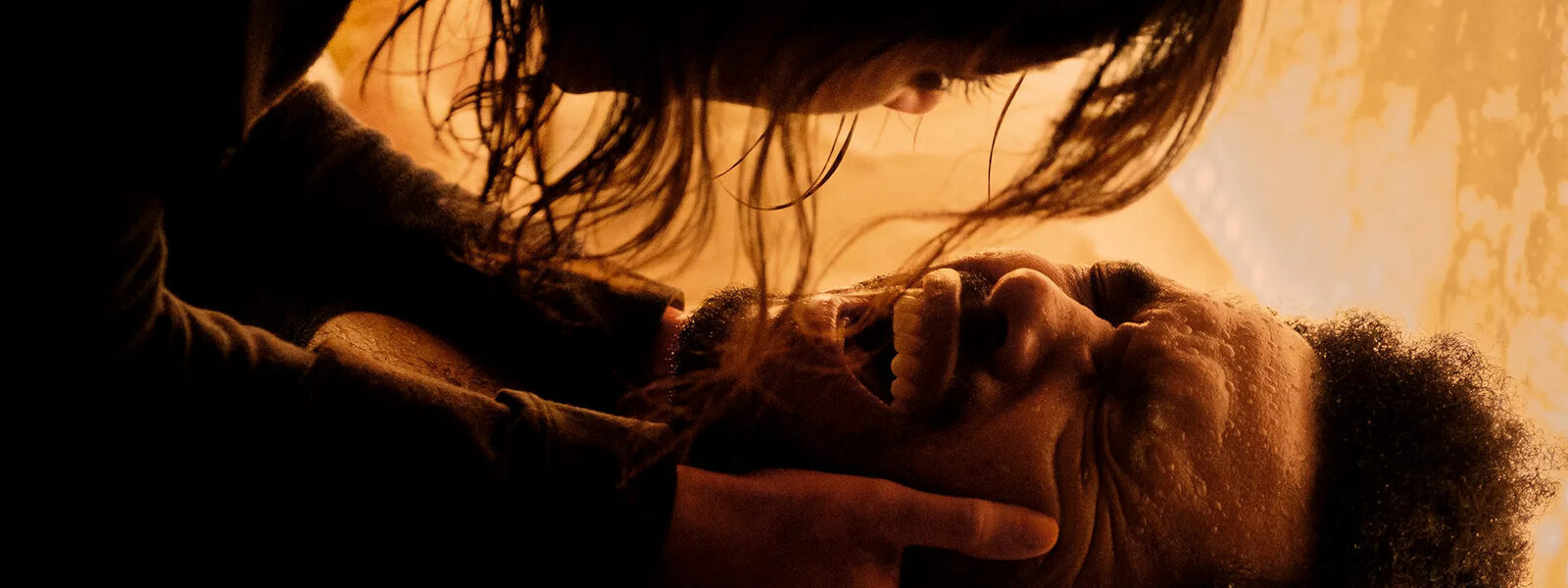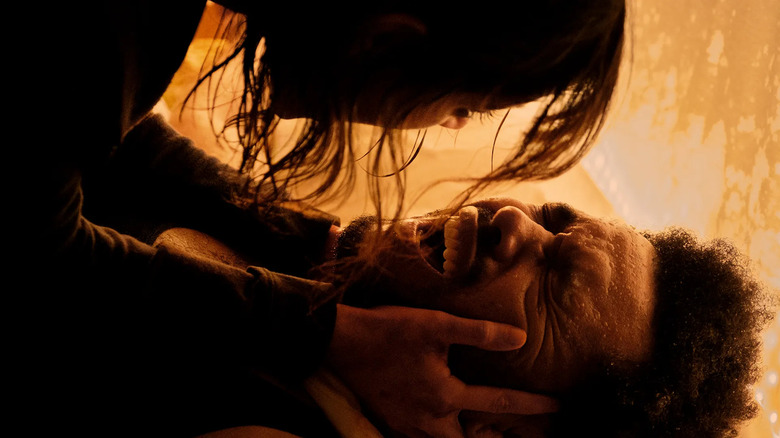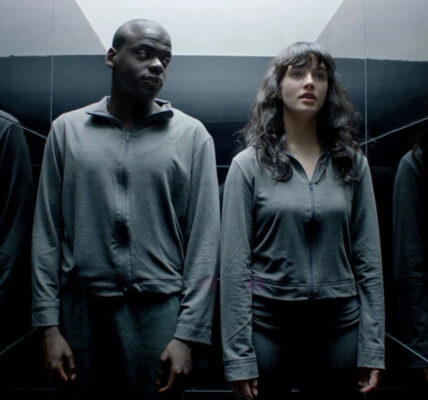The new film by Trey Edward Shults “Hurch Up Tomorrow” is part of a vast multimedia project that Trip-Hop singer Abel “The Weeknd” Tesfaye built since January 2025, when he released a conceptual album of the same name. The film seems to display a story that has been extrapolated from the album by the co-ecrans Shults, Tesfaye and Reza Fahim, although it clearly aims to be a dreamy and hallucinatory opera, telling its story through emotional rhythms outside. And on the surface, there are certainly a lot of emotional effuriates. There are tears, cries and nightmares. Stylistically, there seems to be an attempt to take a look in the inner darkness of the weekend’s beak.
Advertisement
But the whole dreamy electronica of the soundtrack cannot cover the fact that “hurry up tomorrow” is dull, mediocre and bassidéré. It’s bad, guys. Really, really bad. The film does not capture so much from the complex soul of the weekend, because it gives a megaphone to a pitiful whining. Tesfaye tries to set up his character on the screen as a disturbed and suffering artist, lost in a post-rugal discomfort (perhaps self-inflicted), but he never really describes the circumstances of the rupture, or why his ex was so angry with him. Riley Keough, seen only in photos and heard by phone, plays her ex-girlfriend, and she is only credited like “Girl on Vocal Mandail”. Shults and Tesfaye did not carry out a complex drama on the relationships that went wrong, but an abstract examination of the teenager is self-adolescent. The girlfriend is an abstract figure that only exists to allow the main character to wallow in the pathos. The same could be said of Anima (Jenna Ortega), a young woman whose eye attracts during a concert and who can provide his emotional salvation.
Advertisement
And, yes, the character is named “Anima”, which will make all Jung students roll their eyes. And this is one of the most subtle pieces of symbolism in this self-indulgent mess.
Hurry up tomorrow is all style and no substance, and even the style is not so interesting
Shults previously made intriguing films like the slow horror film “It Come Aut of Night”, and the game of dreamy morality “Waves”. Here, it seems under the pistol, trying to put a kind of depth on an artist who is desperate to appear more tortured and complex than perhaps. Shults incorporates a lot of abstract close -ups, Shift -like reports and even artificially inserts film scratches to capture this old 35 mm sensation. In an out -of -competition nightmare sequence, Shults pulls in his interior David Lynch, representing a figure of mother on fire in a field, warming a nearby child. Did I mention that symbolism is not subtle?
Advertisement
However, none of this can erase how emotionally frustrating. The film begins with the aforementioned girl on vocal messaging by telling Tesfaye (he plays himself) that “a good person would not have done that to someone they like”. What did he do? It is never explained. If Tesfaye played his vicious manipulator Tedros of Short -term embarrassment “The Idol”, “ Then, such a message would have made sense, but here we wonder what he did that would justify such a reaction. We don’t know if he’s wrong. All audiences are warned, it is because he suffers.
And, my boy, is it always a shame. The rupture came in the middle of the world weekend tour, and it can become hysterically silent, like the character of Liv Ullmann in “Persona”. A musician loses his voice. See my comments above on the symbolism of the film, vis-à-vis its subtlety. A doctor severely warns him that everything is psychological and that he covers the risk of damaging the throat permanently if he cannot work through his pain. The only character with any TOE child in reality is Tesfaye Lee’s manager (The wonderfully mean Barry Keoghan), an enthusiastic Gremlin coke that uses serious compliments and some snowfields to get his charge on stage.
Advertisement
The long weekend
Just as the weekend’s voice breaks on stage, he locks his eyes with the desperate young animal. They seem to be instantly falling in love, and they make a quick step forward to Coney Island (played by the Santa Monica pier). However, it will probably be dangerous for our hero, because Anima was introduced into tears by tearing a fuel far -off country house and lighting it on fire. Later in the film, Anima will receive a hysterical call from her mother (also, curiously, expressed by Riley Keough) wondering why she did. Anima has no answer.
Advertisement
By the way, the pace is horrible. As Tesfaye and Anima have their small date of roller coaster, we are almost an hour in the film. Nothing happens, but at least we have to wait for it. The evening looks good, but it is only a matter of time before this maniac’s lunia nightmare girl slams.
Anima then pushes in a hurry “hurry up tomorrow” in the “misery” territory, showing what is happening when a slightly cracked surface meets his hero in a vulnerable position. Both “hurry up tomorrow” and “misery”, celebrity will eventually be linked to a bed while their fans torture them and question them. “Hurry up tomorrow” is not as striking, however, as the torture of the surface implies an test analysis of the real art of the weekend. Many will also think of The Huey Lewis sequence in “American Psycho”, “ where a killer essentially reads his own revised aloud. Tesfaye essentially organizes the worst press interview with the world. The torture scenes are not supposed to be funny, but many people in my theater – including me – nevertheless laughed.
Advertisement
Pink Floyd: the wall is not
Ortega tries to lend a certain darkness to the role, but his wild eyes and his illogical behavior emerging him as a semi-comedic character of Tim Burton. The biggest relief in the film (and the biggest laugh) occurs when Tesfaye finally shakes the soft and misty film of the film to tell him to close the F ***.
Advertisement
But a question persists: what is Tesfaye of his own work? Does he say that it calls on tears and deceived incendiaries who bind the victims in the beds? Does it mean that he is emotionally irresponsible by floating songs on suffering in pop consciousness? Does he inspire bad behavior by pushing too hard in front of millions? And if he feels that he is a monster, what did he do? What are his bad habits (beyond coke boots)? None of these questions are answered, or even effectively asked. “Hurry up tomorrow” is a pseudo-emotional porridge that engages in an imaginary version of its hero. “Pink Floyd: the wall,” it’s not.
The weekend, as he is represented in “Hurric Tomorrow”, is empty. The film has the stylistic vocabulary of self-interrogation, but none of immediate brutality. We will not have the impression that the film is a real effusion or a real effusion of guilt. It is not going further than a scene (actually good enough) where Tesfaye loses her cool while leaving a telephone message for her ex. The film moans that being famous is difficult and that the break is difficult to do.
Advertisement
We have to find melancholy entertainment of Weeknd. It’s not. “Hurry up tomorrow. It’s just horrible.
/ Movie assessment: 2 out of 10
“Hurry up tomorrow” opens the rooms on May 16, 2025.









